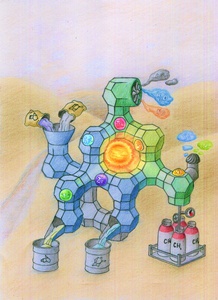Lewis acid zeolites – (green) catalysts for tomorrow
Jan Přech, Ewelina Szaniawská and Jiří Čejka (group of Synthesis, Catalysis and Advanced Materials from the Dept. of Physical and Macromolecular Chemistry) with Steven L. Suib (University of Connecticut, USA) published a paper in the most cited chemistry journal: Chemical Reviews. The article Recent Advances in Tetra- (Ti, Sn, Zr, Hf) and Pentavalent (Nb, V, Ta) Metal-Substituted Molecular Sieve Catalysis critically reviews recent advances in tetra- and pentavalent metal-substituted molecular sieve catalysis.
The Chemical Reviews publishes review articles from all areas of chemistry and it has the highest impact factor (72.1 in 2021) of all chemical journals. Molecular sieves (in particular zeolites) are established materials in industrial catalysis, gas purification and separation, water treatment as well as in, e.g., agriculture. Acidic nature and precisely defined microporosity are the key properties in most of these applications. The acidity is created by isomorphous incorporation of aluminum into mostly siliceous frameworks.
Molecular sieves containing tetra- (Ti, Sn, Zr, Hf) and pentavalent (V, Nb, Ta) metals in framework represent water-tolerant Lewis acids that catalyze redox and isomerization reactions (epoxidations and other selective oxidations, hydrogen transfer reactions, dehydrations, isomerization of sugars). These reactions are becoming more and more important with the aim of reducing the industrial waste production and using biobased raw materials. With the exception of titanosilicates (first patent from 1983), these materials have been discovered only recently and their full potential has not yet been explored.
The group of Synthesis, Catalysis and Advanced Materials has been long investigating these materials, for instance in frame of the prestigious ERC-CZ grant obtained by Mariya Shamzhy.

